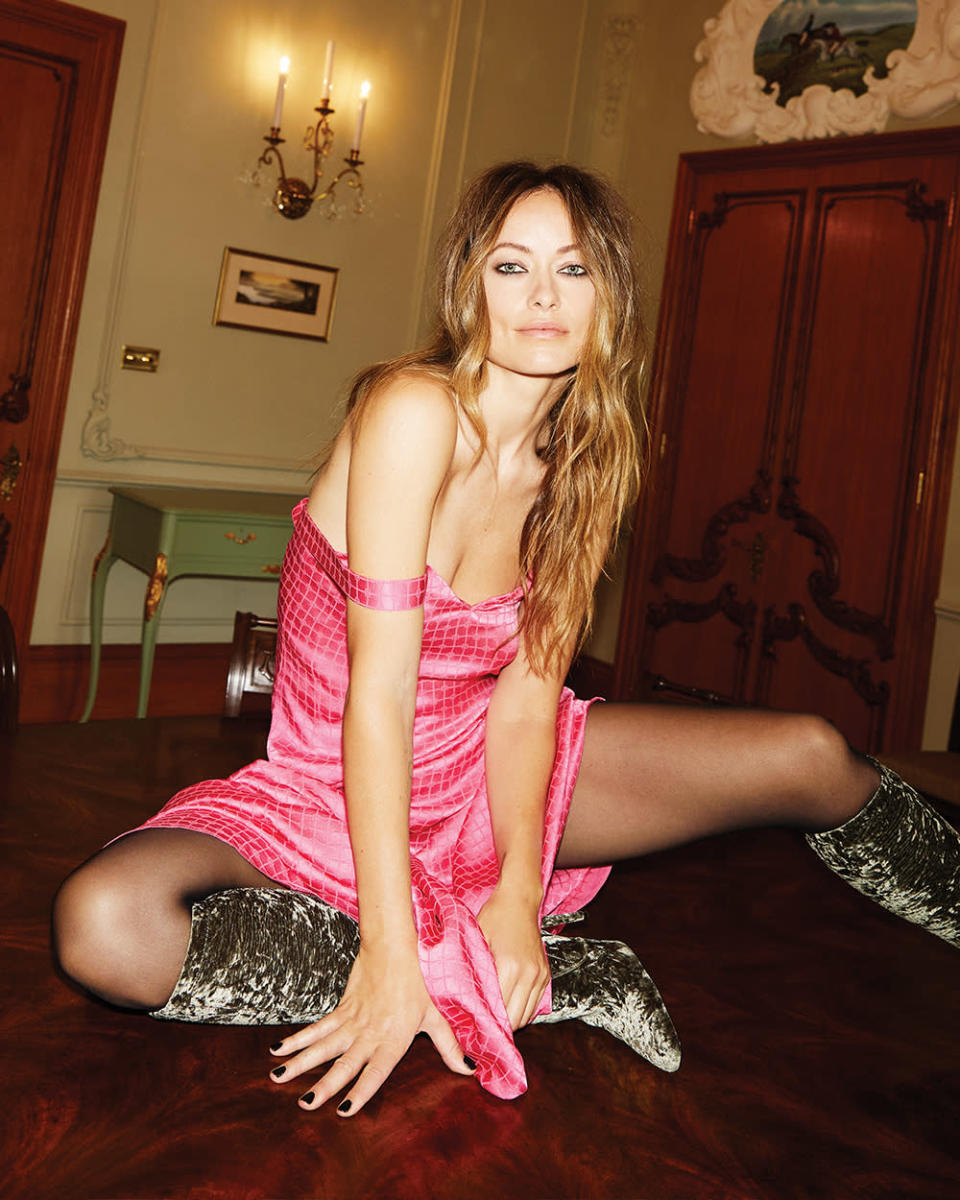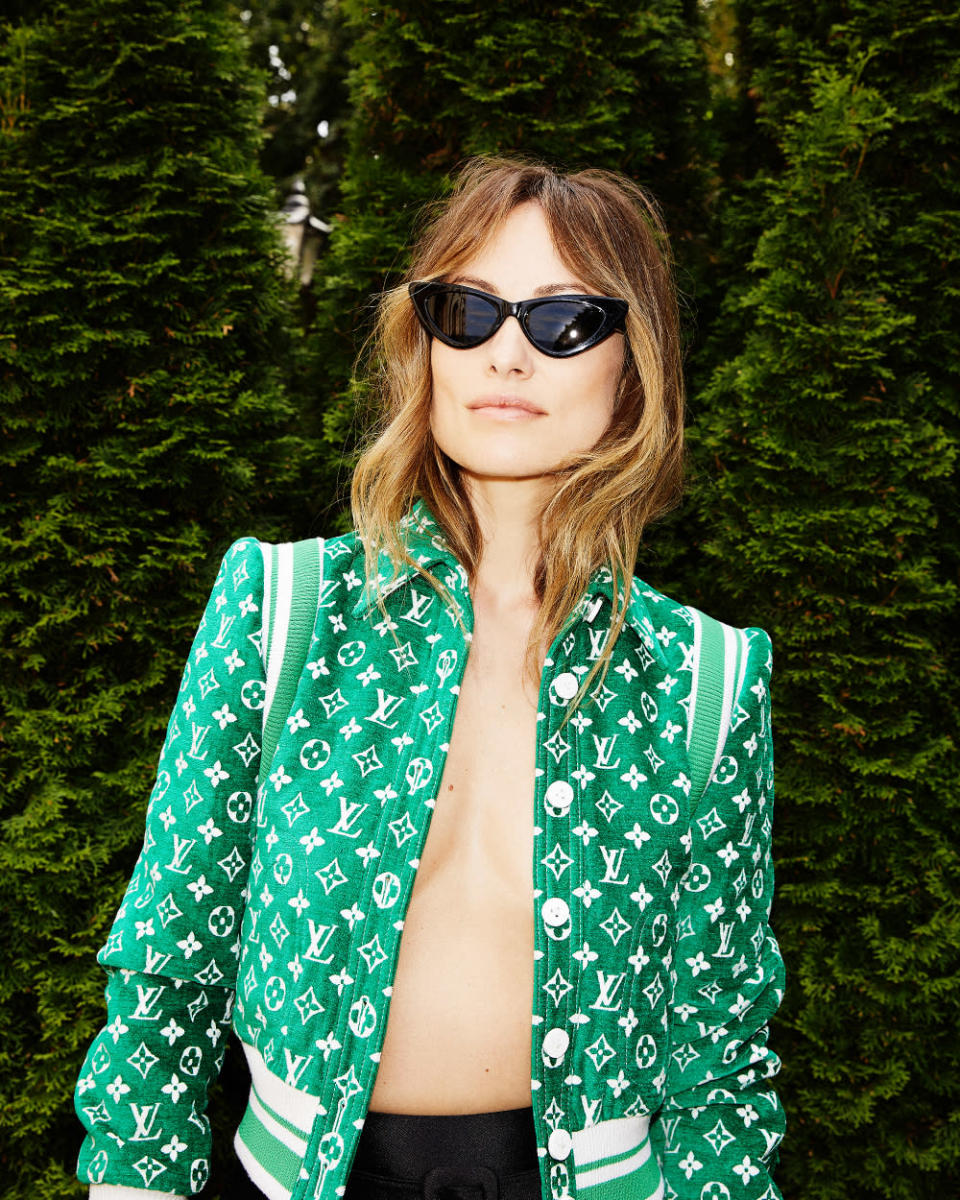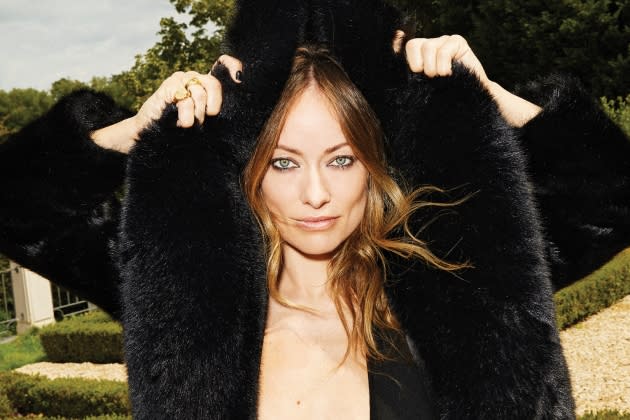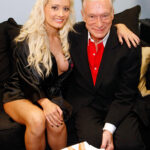
It’s teatime in London, and Olivia Wilde is talking about the O-word. No, not the Oscars, but her approach to sex scenes in her new movie, “Don’t Worry Darling.” “Men don’t come in this film,” she declares over cucumber sandwiches and scones at Claridge’s, just blocks away from Buckingham Palace. “Only women here!”
In Wilde’s second directorial outing after 2019’s indie high school coming-of-age story “Booksmart,” Florence Pugh and Harry Styles star as a married couple living in a quaint, experimental utopia called Victory. Pugh plays Alice, a “Mad Men”-type housewife whose reality begins to crack, revealing disturbing truths underneath her seemingly perfect world. When the trailer for the sci-fi thriller dropped in May, social media was buzzing about Styles’ character, Jack, going down on Alice on top of a dining room table.
More from Variety
“Female pleasure, the best versions of it that you see nowadays, are in queer films,” Wilde says. “Why are we more comfortable with female pleasure when it’s two women on film? In hetero sex scenes in film, the focus on men as the recipients of pleasure is almost ubiquitous.”
Wilde, 38, sees the world through a post-feminist prism, and the women in her films drive action on their own, without the help of men.
“It’s all about immediacy and extreme passion for one another,” Wilde says of the film’s complicated central relationship. “The impractical nature of their sex speaks to their ferocious desire for one another. I think it’s integral to the story itself and how the audience is meant to connect to them. My early conversations with the cast were all about how the audience has to buy into the fantasy.”


Wilde, whose acting credits include everything from the medical drama “House” to Ron Howard’s “Rush” and Clint Eastwood’s “Richard Jewell,” is wearing a black T-shirt, baggy jeans and scuffed-up Converse low tops. On this July afternoon, she has come to Claridge’s directly from a pottery class, with dried clay on her arms when she arrives. “People were looking at me in the bathroom like I probably shouldn’t be here,” says Wilde, seated at a back corner table of the tearoom where she goes unnoticed amid the sea of pastel-adorned guests in pumps and pearls. Without makeup, except a smudge of leftover eyeliner, Wilde looks more like a film student than one of Hollywood’s up-and-coming directors. Showing up alone with no security, she doesn’t seem like someone who’s constantly dodging paparazzi on the cobblestone streets of London — where she lives with her two children, Otis, 8, and Daisy, 5 — being one of the most talked-about celebrities of the moment.
“It’s harder for women to get a second chance at directing,” Wilde says, recognizing that “Booksmart” was a critical triumph but by no means a box office smash, making $25 million on a $6 million budget. “Fewer people will invest in the second film of a woman than a man,” she says. “I was so lucky. My movie didn’t make a billion dollars. It struck enough of a nerve of the cultural zeitgeist that I was allowed to have another opportunity. I really feel, at this point, that I have earned the right to say I’m a director.”
The stakes are indeed high for “Don’t Worry Darling,” which debuts at the Venice Film Festival on Sept. 5. If the film, which had a budget of about $20 million, succeeds at the box office when it opens on Sept. 23, it will elevate Wilde to a short list of top-tier women directors — and an even shorter list of female actors-turned-directors (Elizabeth Banks, Jodie Foster, Greta Gerwig, Maggie Gyllenhaal, Rebecca Hall, Angelina Jolie, Regina King, Barbra Streisand and … that’s about it). Warner Bros., the studio behind the film, could use an original hit outside the realm of comic-book movies, particularly since the company, post-Discovery merger, is undergoing plenty of public turmoil.
And for better or worse, “Don’t Worry Darling” has generated no shortage of headlines. It’s the project where Wilde met Styles, now her boyfriend. It’s also linked to an incident in April at CinemaCon where Wilde was served custody papers from her former fiancé, “Ted Lasso” actor Jason Sudeikis, as she took the stage in Las Vegas to promote the movie to exhibitors.
At the time, Sudeikis said in a statement that he had “no prior knowledge” of the ambush and “would never condone her being served in such an inappropriate manner.” Since then, a judge has granted Wilde’s request to dismiss Sudeikis’ petition, which asked for Otis and Daisy to eventually reside with him in New York.
“It was my workplace,” Wilde says, referring to the CinemaCon incident without naming Sudeikis, with whom she was in a relationship from 2011 to 2020. “In any other workplace, it would be seen as an attack. It was really upsetting. It shouldn’t have been able to happen. There was a huge breach in security, which is really scary. The hurdles that you had to jump through to get into that room with several badges, plus special COVID tests that had to be taken days in advance, which gave you wristbands that were necessary to gain access to the event — this was something that required forethought.”
CinemaCon was supposed to be a professional milestone for Wilde, who was about to screen footage from her movie. She didn’t miss a beat when she was interrupted by the mysterious envelope — she just carried on with her presentation. “I hated that this nastiness distracted from the work of so many different people and the studio that I was up there representing,” she says. “To try to sabotage that was really vicious. But I had a job to do; I’m not easily distracted.” She adds, “But, you know, sadly, it was not something that was entirely surprising to me. I mean, there’s a reason I left that relationship.”
Wilde pauses, trying to summon the right words. She states, for the record, that she splits custody; the kids go back and forth between her and Sudeikis week to week. (Wilde first moved to London a few years ago with her family because that’s where Sudeikis films “Ted Lasso,” and now splits her time between the U.K. and L.A.) When Wilde is with her children, she’s entirely with her children, she says. She makes breakfast every morning, never misses bedtime and takes them to school herself. “They are my world,” she says. “They are my best friends.”
Back to CinemaCon, Wilde says, “The only people who suffered were my kids, because they’ll have to see that, and they shouldn’t ever have to know that happened. For me, it was appalling, but the victims were an 8- and 5-year-old, and that’s really sad. I chose to become an actress; I willingly walked into the spotlight. But it’s not something my children have asked for. And when my kids are dragged into it, it’s deeply painful.”


After “Booksmart,” Wilde was offered another comedy to direct. But she had other plans. In fact, she had started ruminating on an idea long before “Booksmart” came along — actually, when Donald Trump came into office. “What are we going to do?” she recalls thinking.
“I was looking for a way to tell a story about what happens when someone is willing to sacrifice a system that serves them in order to do the right thing,” Wilde says while eating an egg salad sandwich. (“This country loves mayonnaise, doesn’t it?” she says, polishing off half the platter.) “I was also thinking a lot about my place in society as someone who could rage against the patriarchy but in many ways totally benefits from it.”
Wilde decided to trust her gut, and she turned down a slew of comedic scripts. “Science fiction has a long history in film of allowing for political issues to be spoken out through entertaining narratives,” she says. “I don’t enjoy or feel inspired by stories that oversimplify feminism. It’s so much more complicated.” At the same time, Wilde didn’t want her next film to feel in any way “preachy.”
She found the idea for her project in a spec script from writers Carey and Shane Van Dyke that made the 2019 Black List. The story, which became “Don’t Worry Darling,” was set in an idyllic yet sinister 1950s town.
“It felt like adapting a great piece of IP,” Wilde says. “It allowed for a really inspiring jumping-off point.” She brought on Katie Silberman, her partner from “Booksmart,” to rewrite what became the current screenplay. In the prep phase, the duo came back to Betty’s Friedan’s 1963 classic “The Feminine Mystique” more than a few times.
They also went down the rabbit hole of what Wilde calls the “disenfranchised world of white men on the internet,” scouring 4chan, studying YouTube algorithms, researching groupthink perpetuated by social media and incel leaders. “I have a sick fascination with cults,” Wilde says.
When the project was first announced in 2019, one outlet touted it as a psychological thriller “for the Time’s Up era.” The film sparked a heated bidding war, with 18 studios and streaming services fighting to land the pitch. Ultimately, New Line Cinema won the auction; Wilde reveals she chose the Warner Bros.-owned studio because it was the only one that promised her an exclusive theatrical release.
“I suddenly had the opportunity to make the decision of what would be the best home for us,” Wilde says. “I wanted to work with the place that would not only allow me to make the film the scale that it deserved, but to cast the people I wanted and release it in the way I wanted — and I wanted theatrical. Warner Bros. was the only place that promised me theatrical in writing. I took less money there than other places because [Warner] had said it belonged in theaters.”
Looking back on the negotiations to acquire the script, Richard Brener, the president of New Line, tells Variety, “We had to have it.” As for Wilde’s insistence on a theatrical release, he says, “If somebody makes us make it theatrical, we’re not going to fight them.”
In one of the film’s trailers, Alice attempts to suffocate herself by wrapping her head in Saran Wrap. In another scene, she’s violently squashed by an expansive window that closes in on her as she cleans the house while her husband is at work.
Wilde says she wanted to create paradise, but clarifies: “Paradise as defined by the largely monogamous, misogynistic media and world that we’ve grown up with.” She shares that she’s drawn to 1950s and ’60s fashion, movies such as “Ocean’s Eleven,” Frank Sinatra and the high-society photographer Slim Aarons. “My version of paradise is very nostalgic and actually comes from a world that doesn’t serve me as a woman at all,” she says. “We can talk about our complicity. Or someone who’s willing to burn the whole motherfucker down.”


After “Don’t Worry Darling” sold to Warner Bros., Wilde was set to play Alice. She says her attachment as star helped sell the film, but she felt there could be someone better. Also, she liked the idea of Alice and Jack being a younger couple: “There was something about the youthfulness, the innocence, that really made sense for the story. If I was Alice, I was like, ‘Well, I’m going to be with a Jack who’s my age or older, and now we’re in a different age bracket.’”
The studio had another lead circling the project, but Wilde had seen Pugh in the 2019 horror darling “Midsommar.” “I had been blown the fuck away by her,” Wilde says. “I loved the film, but I loved her. I was just like, ‘Well, she’s extraordinary. She’s clearly the most exciting young actress working today.’”
Pugh — who declined to be interviewed for this story (her publicist said she’s filming “Dune: Part Two” in Budapest) — was initially in talks for the role of Bunny, the supporting character that Wilde ended up playing. But after a lunch together, Wilde walked away knowing she’d found her Alice. At that point, Pugh’s Oscar-nominated turn in “Little Women” hadn’t yet been released, “but we knew she was a superstar,” Wilde says.
Narratives about Hollywood productions have always been a staple of the gossip columns. But in the age of social media, rumors can take on a whole other life. For “Don’t Worry Darling,” internet sleuths have dissected each and every detail since the very first announcement of the film’s existence. After Wilde posted on Instagram an adoring behind-the-scenes photo of Pugh at work, TikTokers noticed that Pugh didn’t share anything about the film in return. The internet theorizing has run rampant, and Page Six ran an anonymously sourced story claiming that Pugh was unhappy about Wilde and Styles’ relationship. Then came a report that Styles was being paid more than three times the amount Pugh was getting paid.
Wilde denies that, saying in an email later, “There has been a lot out there that I largely don’t pay attention to. But the absurdity of invented clickbait and subsequent reaction regarding a nonexistent pay disparity between our lead and supporting actors really upset me. I’m a woman who has been in this business for over 20 years, and it’s something that I have fought for myself and others, especially being a director. There is absolutely no validity to those claims.”
Beyond that, neither Wilde nor Pugh has bothered to comment on the tabloid-driven feud. But during our conversation, Wilde is effusive about working with Pugh.
“We were all brought so close by the bubble of the production,” Wilde says, and she praises Pugh and Styles as acting partners. “She was really a great supporter of his as someone who was newer to a film set. And he was such a great supporter of hers, as someone who understood it was her film.”
With her key actor in place, Wilde teamed up with Pugh to find their Jack. Wilde liked Styles’ work in “Dunkirk,” and had heard from producers on the film that the musician was “an absolute dream, and went above and beyond in terms of being prepared.” Pugh was also enthusiastic about the idea of Styles joining the film, Wilde says — but he was touring and unavailable. Eventually, Shia LaBeouf landed the part.
But in 2020, as production was just starting, Wilde made the decision to fire LaBeouf. The studio cited a scheduling conflict. Now, for the first time, Wilde speaks about the situation: “I say this as someone who is such an admirer of his work. His process was not conducive to the ethos that I demand in my productions. He has a process that, in some ways, seems to require a combative energy, and I don’t personally believe that is conducive to the best performances. I believe that creating a safe, trusting environment is the best way to get people to do their best work. Ultimately, my responsibility is to the production and to the cast to protect them. That was my job.”
A few months after LaBeouf’s exit from “Don’t Worry Darling,” his ex-girlfriend and “Honey Boy” co-star, FKA Twigs, sued him for sexual battery. (The lawsuit goes to trial in April.) The next month, LaBeouf split from his agency, CAA, and entered an inpatient facility.
“A lot came to light after this happened that really troubled me, in terms of his behavior,” Wilde says. “I find myself just really wishing him health and evolution because I believe in restorative justice. But for our film, what we really needed was an energy that was incredibly supportive. Particularly with a movie like this, I knew that I was going to be asking Florence to be in very vulnerable situations, and my priority was making her feel safe and making her feel supported.”


When the global pandemic hit, Styles’ tour was canceled, and his schedule was suddenly free. “We found the perfect Jack, and luckily, it’s kind of magical that it ended up being our first choice,” Wilde says.
“I think the story as a whole attracted me to the role of Jack,” Styles says in an email from Toronto, one of the stops on his 84-date Love On Tour. “It felt like an opportunity to play someone who is incredibly complex, caught between love and obsession. There were always two sides of the character to play with. It’s fun to play someone that you feel like you’re trying to work out the whole time.”
“Don’t Worry Darling” could transform Styles’ acting career. (It’s one of two movies he has out this fall — the other is the prestige drama “My Policeman,” which Amazon Studios will release on Oct. 21.) “Harry obviously is a revelation,” Brener says. Celebrating his performance, the executive adds, “I think there will very quickly be a conversation about why is he even bothering with music when he is such a huge movie star?”
Styles shares the best piece of advice Wilde gave him on the project: “The first step is to lose the Oscar you won in the shower that morning. Listen, and do the scene with your partner, not at them. Be a human, tell the truth.”
He says he was inspired by Wilde’s passion for her work. “As a director, Olivia is incredibly focused. She communicated what she was looking for from the cast with both clarity and respect,” Styles says. “I think transitioning from acting into directing has made her a director who knows how to get the best out of everyone.”
Wilde and Styles have not publicly commented on whether they’re a couple — although paparazzi photos have made it clear they are. “I’m not going to say anything about it because I’ve never seen a relationship benefit from being dragged into the public arena,” Wilde says. “We both go out of our way to protect our relationship; I think it’s out of experience, but also just out of deep love.”
Wilde is less guarded about the toxicity of tabloids. She understands that media attention comes with her chosen career. But she can’t wrap her head around the extra vitriol directed at women. “The whole culture of celebrity gossip is interesting as a distracting tool to numb people from the greater pains of the world,” she says. “Escapism is really a very human quality, searching for something to anesthetize the painful reality of so many people’s lives. I don’t blame people for seeking escapism, but I think the tabloid media is a tool to pit women against one another and to shame them.”
Wilde then goes on a 14-minute tangent about how we’re all complicit in a culture that propagates a narrative that women are to be compared with one another, thus holding them back from their full potential and happiness. And the cycle of not believing in women stems from the post-Depression ideal of a nuclear family unit led by the father, a deeply internalized system designed to control women. “Listen, I’m not asking for any sort of pity. My life is extraordinary. I’m thrilled with my life,” she says. “But I do wish, for the betterment of society in general, that we would all disengage from a cycle of bullying and hatred. We’ve just lost empathy, and we just don’t give people the benefit of the doubt — specifically women. We just assume the worst from women, and I don’t know why.”
Since her breakup with Sudeikis and dating Styles, Wilde has felt her privacy violated. “The last two years, my family has gone through this kind of restructuring and a revolution that should be a totally personal experience,” Wilde says. “And it’s not. The most painful element of it has been women shaming me for making a decision that was for my own health and happiness.”
There is a double standard: When she and Styles are photographed together, she’s judged for dating a younger man; just as often, she’s labeled an absentee mother. “When people see me not with my kids, it’s always ‘How dare she,’” Wilde says. “I’ve never seen anyone say that about a guy. And if he is with his kid, he’s a fucking hero.”
This summer, Wilde was supposed to be directing another movie— “Perfect,” a 1990s-set biopic about Olympic gold medalist Kerri Strug (to be played by Thomasin McKenzie). As the producers reworked the script to reflect all that’s transpired with the USA Gymnastics sex-abuse scandal, Wilde decided that she also needed a break. “It became clear to me that this year was a time for me to be a stay-at-home mom,” she says. “It was not the year for me to be on a set, which is totally all-encompassing. It was time for me to pause and devote myself to the kids when I have them.”


“Could you imagine the production design of a $100 million Nancy Meyers movie?” Wilde ponders over another cup of tea. “Imagine the kitchen!”
Wilde is discussing the staggeringly low number of women who have directed a film with a $100 million budget. This is another short list: Chloé Zhao (“Eternals”), Patty Jenkins (“Wonder Woman”), Niki Caro (“Mulan”), Ava DuVernay (the first woman of color to receive a $100 million budget with “A Wrinkle in Time”) and Gerwig with her forthcoming “Barbie.” Notably, all of these films were released in the past five years. Kathryn Bigelow, whose “K-19: The Widowmaker” was budgeted at just under $100 million, faced a career freeze after that film flopped in 2002. She would go on to become the first woman to win the directing Oscar in 2010. Meyers, whose films have grossed $1.4 billion worldwide, hasn’t been invited to the $100 million club.
“I do feel very passionately that if more female filmmakers are trusted with bigger budgets, we will see box office successes that will then inspire more female-directed films to get greenlit,” Wilde says. Before helming “Booksmart,” Wilde forged her own path behind the camera on short films and music videos, including for the Red Hot Chili Peppers and Edward Sharpe and the Magnetic Zeros.
“I remember her specifically saying when she was hiring crew, ‘You have to look beyond their résumé,” says Beanie Feldstein, who starred in “Booksmart.” “Because people are not given opportunities at the same rate, and therefore their résumés are not reflective of that,’”
On “Don’t Worry Darling,” Wilde asked the cast to give creative input. “Any great actor is also a screenwriter in the process,” she says. “They are responsible for creating the life of the character, so they bring so many ideas.” In the film, Alice is heard humming a mysterious tune, which is featured prominently throughout. Wilde reveals that Styles offered to write the melody, which in the script was described only as “the trigger song.”
“In prep,” Wilde says, “Harry called me and said, ‘What’s the trigger song? Like, what’s the melody?’ I said, ‘I don’t know. I’m going to different writers to write it. Do you have anything in mind?’ And he said, ‘I’ll think about it.’” She pauses. “Five minutes later, he sent me a demo from his piano, and it was what ended up in the film. He called me and said, ‘What about this?’ And I was like, ‘Yeah, that’s it. That’s it. And that’s really insane that you did that in five minutes.’”
“I wanted something that could be both sweet and creepy, entirely dependent on the context,” Styles says. “I remember first playing it on the piano, and it had a sort of homemade nursery rhyme feel to it. Applied to the different moments in the film, I think it takes on a couple of different lives — I hope.” Styles doesn’t sing in the movie, but he dances. “’Twas I, tap-dancing,” he says. “I feel like I’ve been waiting for someone to require a 35-second tap routine from me my whole life.”
Coming up, Wilde has just one on-camera role on her slate — in Damien Chazelle’s “Babylon,” starring Brad Pitt and Margot Robbie, which she describes as a blink-and-you’ll-miss-it cameo. She says she’s fully focused on directing right now, but is absolutely open to acting. “For the right director who I could really learn from, I’d be so psyched.”
Behind the camera, in addition to “Perfect,” she has several projects in the works, including a documentary, two films that she’s just started to develop and a top-secret Marvel project that she refuses to comment on. “That, I can’t say a word about. Yeah, no — I can’t say anything about it,” she says, squirming. “I have to bury myself in the couch now.” She laughs.
“I will say that I think the Marvel approach of allowing newer filmmakers to come into the fold and have access to those tools of the Marvel universe is incredibly exciting. I am a big fan of what they’re doing over there,” she offers, “but, yeah, I can’t confirm whether that is what that is.”
With a sly smile, she blurts out, “But that would be cool.”
Styling: Aimee Croysdill/The Wall Group; Makeup: Wendy Rowe/The Wall Group/Dior Beauty; Hair: Christian Wood/The Wall Group; Manicure: Jessica Thompson/Eighteen Management; Production: JOON; Look 1 (black fur): Jacket, jumpsuit and shoes: YSL; Earrings: Completed Works; Look 2: (cover, black ruffle close up): Ellie Saab; Earrings: Alessandra Rich; Look 3 (pink): Dress: Chanel; Boots and tights: Heist; Earrings: Boucheron; Look 4 (green jacket): Jacket: Louis Vuitton; Skirt: Prada; Sunglasses: Attico; Look 5 (zebra): Jacket, top, skirt and necklace: Alessandra Rich; Tights: Heist: Gloves: Gucci x Adidas; Shoes: YSL; Sunglasses: Attico
Best of Variety
Sign up for Variety’s Newsletter. For the latest news, follow us on Facebook, Twitter, and Instagram.




